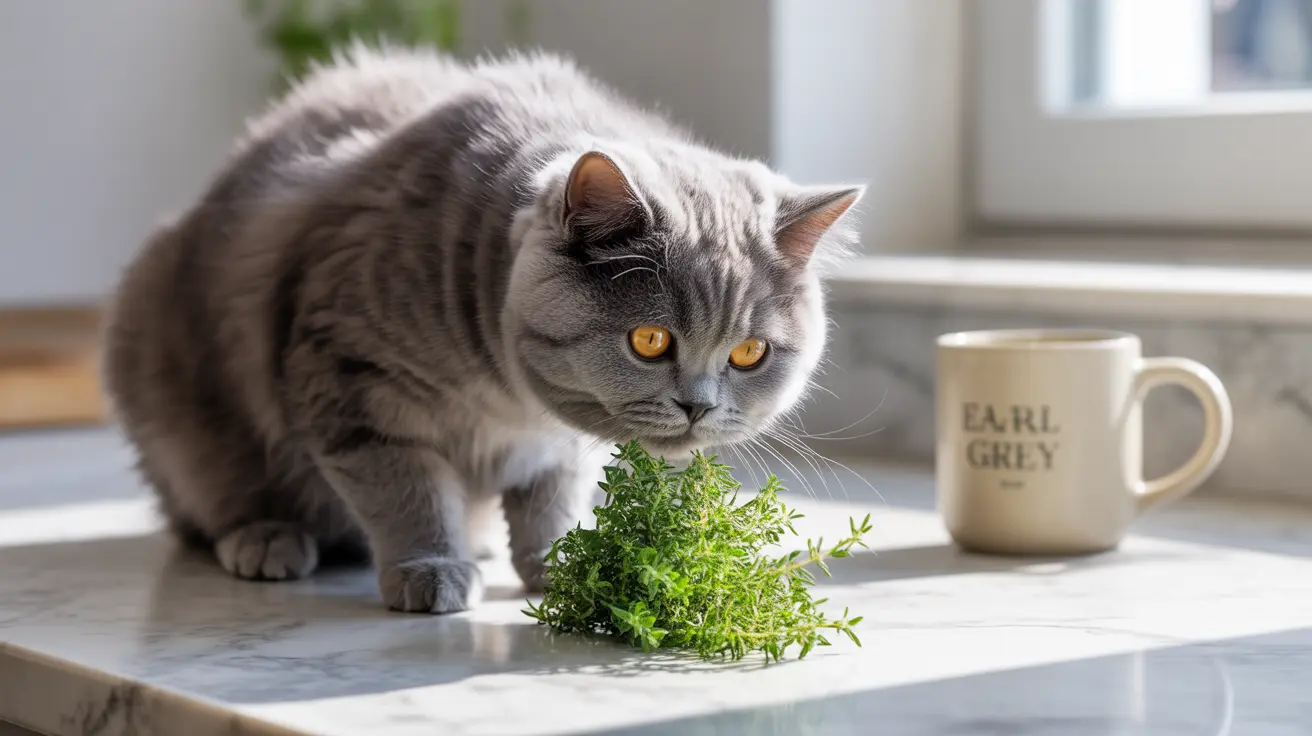Understanding Thyme and Cats
As a pet parent, you might wonder about the safety of common herbs around your feline friend. Thyme, a popular culinary herb, raises particular concerns regarding its toxicity to cats. While the relationship between cats and thyme is nuanced, understanding the safety implications is crucial for responsible pet care.
Natural thyme in small amounts is generally considered non-toxic to cats. However, certain forms of thyme, particularly essential oils and concentrated extracts, can pose serious health risks to our feline companions. Let's explore the complete safety profile of thyme for cats and what you need to know as a pet owner.
Safe vs. Dangerous Forms of Thyme
When it comes to thyme and cats, not all forms are created equal. Fresh thyme leaves, when used in minimal amounts, are typically safe for cats. However, concentrated forms can be dangerous:
Fresh Thyme
- Generally safe in small quantities
- Should be clean and organically grown
- Best used in veterinary-approved amounts
Dangerous Forms
- Thyme essential oils (highly toxic)
- Concentrated extracts
- Dried thyme with unknown processing methods
Potential Health Risks and Toxicity
While natural thyme isn't typically toxic, certain situations can lead to adverse reactions in cats. The main concerns include:
Individual sensitivity can cause gastrointestinal upset, even with small amounts. More serious reactions might occur with concentrated forms, particularly due to cats' inability to process certain compounds found in thyme.
Warning Signs of Adverse Reactions
- Vomiting and diarrhea
- Lethargy and weakness
- Drooling or excessive salivation
- Difficulty breathing
- Skin irritation or allergic reactions
Safe Usage Guidelines
If you're considering incorporating thyme into your cat's environment, follow these safety guidelines:
- Always consult with your veterinarian first
- Use only fresh thyme in tiny amounts
- Never expose cats to thyme essential oils
- Monitor for any adverse reactions
- Keep thyme plants out of direct reach
Benefits and Limitations
When used appropriately, thyme may offer some benefits for cats, including:
- Mild antibacterial properties
- Potential digestive support
- Natural antioxidant effects
However, remember that cats are obligate carnivores and don't require herbs in their diet. Any potential benefits should be weighed against the risks of exposure.
Frequently Asked Questions
Is thyme safe for cats to eat, and in what amounts?
Fresh thyme is generally safe for cats in very small amounts. However, it should only be offered under veterinary guidance and in properly formulated pet products. Avoid giving raw thyme directly to your cat without professional advice.
What are the symptoms if my cat ingests too much thyme or reacts badly to it?
Common symptoms include vomiting, diarrhea, lethargy, and potential allergic reactions like skin irritation. If you notice any of these symptoms, discontinue thyme exposure and contact your veterinarian immediately.
Why is thyme essential oil dangerous for cats, and what symptoms should I watch for?
Thyme essential oil is highly toxic to cats because they lack the enzymes needed to process concentrated compounds like thymol. Symptoms of essential oil poisoning include severe gastrointestinal issues, neurological problems, difficulty breathing, and potential liver damage.
Can thyme provide any health benefits for my cat, or is it unnecessary in their diet?
While thyme contains some beneficial compounds like antioxidants and antibacterial properties, it's not necessary for a cat's diet. Any potential benefits should be obtained through veterinary-approved supplements or foods rather than raw herb consumption.
How should I introduce thyme to my cat safely, and when should I consult a vet?
Always consult your veterinarian before introducing any new herb to your cat's environment. If approved, start with minimal amounts in veterinary-formulated products, and carefully monitor your cat for any adverse reactions.
Conclusion
While natural thyme isn't generally toxic to cats, careful consideration must be given to its use and form. The safest approach is to consult with your veterinarian before introducing any herb into your cat's environment. Remember that thyme essential oils should always be avoided, and any exposure to thyme should be carefully monitored for adverse reactions.






